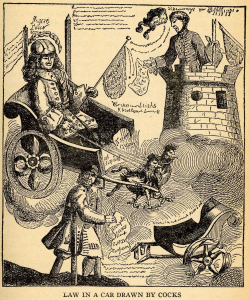 I wish that I had time to read this paper by David Levy and Sandra Peart.
I wish that I had time to read this paper by David Levy and Sandra Peart.
It’s about political comics (cartoons) drawn to depict John Law and the Mississippi Bubble of the early 1700s. It also speaks to subtlely different meanings of the words “alchemy” and “occult” than we are used to today. Here is an early paragraph in the paper:
Non-transparency induces a hierarchy of knowledge. The most extreme form of that sort of hierarchy might be called the cult of expertise in which expertise is said to be accompanied by godlike powers, the ability to unbind scarcity of matter and time. The earliest debates over hierarchy focused on whether such claims are credible or not.
Here is the abstract:
Economists have occasionally noticed the appearance of economists in cartoons produced for public amusement during crises. Yet the message behind such images has been less than fully appreciated. This paper provides evidence of such inattention in the context of the eighteenth century speculation known as the Mississippi Bubble. A cartoon in The Great Mirror of Folly imagines John Law in a cart that flies through the air drawn by a pair of beasts, reportedly chickens. The cart is not drawn by chickens, however, but by a Biblical beast whose forefather spoke to Eve about the consequences of eating from the tree of the knowledge. The religious image signifies the danger associated with knowledge. The paper thus demonstrates how images of the Mississippi Bubble focused on the hierarchy of knowledge induced by non-transparency. Many of the images show madness caused by alchemy, the hidden or “occult.”
Hat tip: Tyler Cowen.